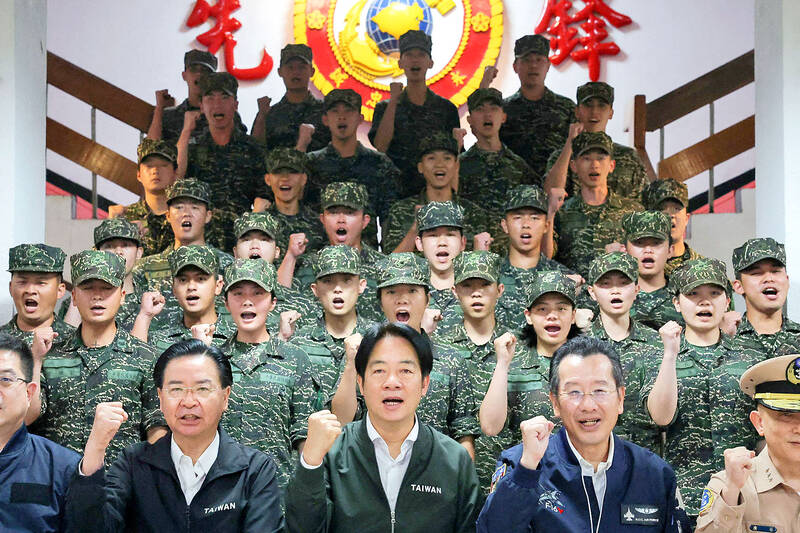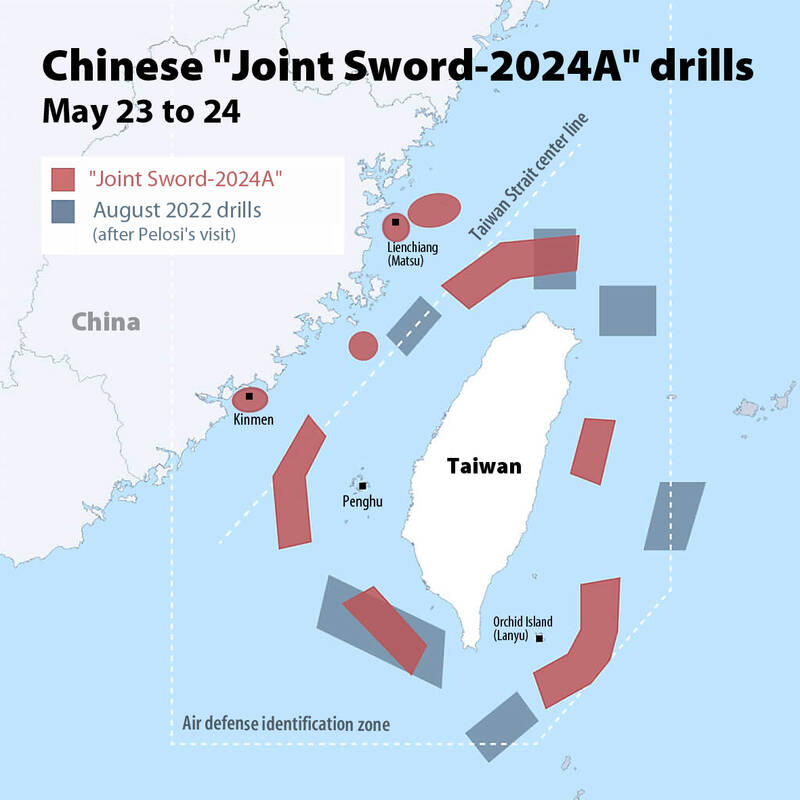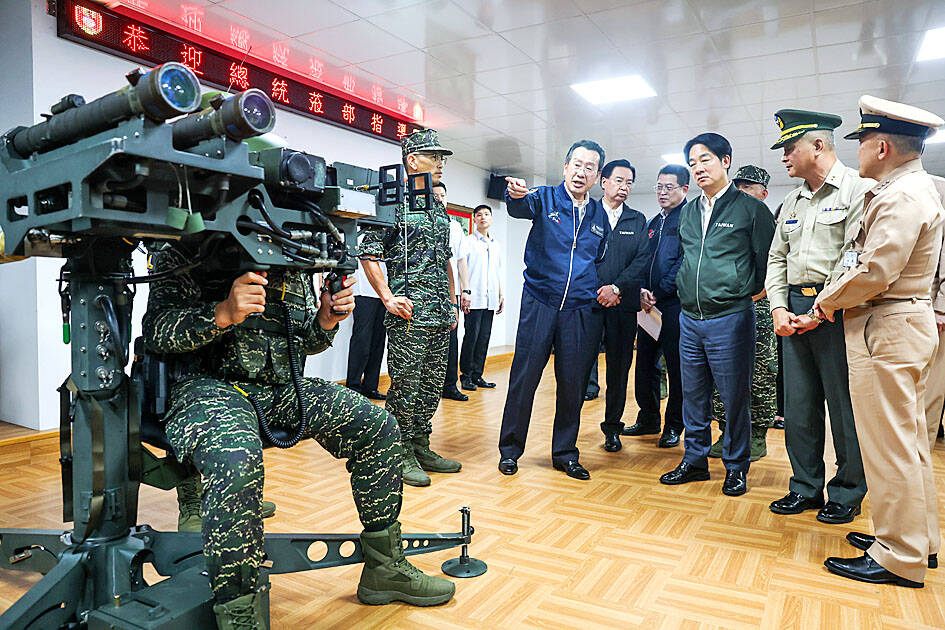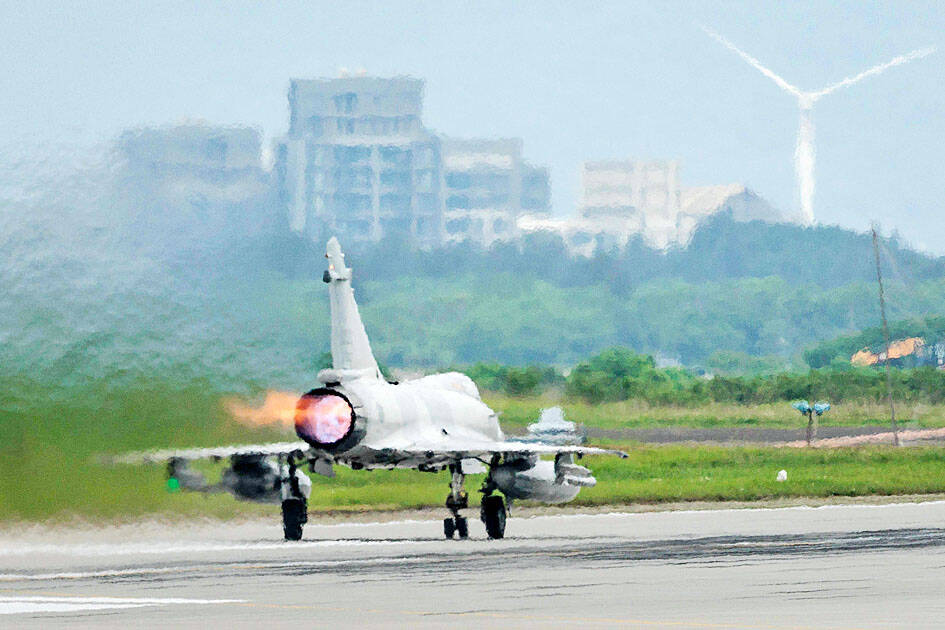President William Lai (賴清德) yesterday vowed to defend Taiwan’s freedom while preserving peace in the region, as Beijing began two days of drills around Taiwan as “punishment” for “separatist acts.”
As of 2pm, China had dispatched 15 combat ships, 16 coast guard ships, and 42 fighter jets and early warning aircraft during the first day of its “Joint Sword-2024A” exercises around Taiwan, the Ministry of National Defense told a news conference.
The exercises were launched by China’s People’s Liberation Army (PLA) Eastern Theater Command soon after it made an announcement at 7:45am yesterday, said Major General Huang Wen-chi (黃文?), assistant deputy chief of staff for intelligence.

Photo: Ann Wang, Reuters
Of the Chinese coast guard ships, four were detected off the east coast of Taiwan, three were off the southeast coast and nine were in waters near Kinmen and Lienchiang (Matsu) counties, he said.
Twenty-eight of the 42 aircraft entered the nation’s response zone, Huang said.
“Unlike China’s previous military exercises around Taiwan, it did not give precise longitudes and latitudes in which military exercises would be held, nor did it announce no-fly zones,” he said.

Source: CNA
PLA aircraft and vessels did not enter the nation’s contiguous zone, which is 24 nautical miles (44km) off Taiwan proper, Huang said, adding that no live-fire exercises were detected.
Major General Tung Chih-hsing (董冀星), head of the ministry’s joint combat planning department, said that Chief of the General Staff Admiral Mei Chia-shu (梅家樹) presided over a combat readiness guidance meeting and gave two key instructions to the military.
“First, the military was asked to step up its intelligence-gathering and reconnaissance efforts, and elevate response command and control at all levels. Second, all levels of the military must handle the situation using crisis management procedures and maintain normal combat readiness tasks and reconnaissance drills,” Tung said.

Photo: CNA
Major General Lou Woei-jye (樓偉傑), director of the Political Warfare Bureau’s Cultural and Psychological Warfare Section, said that the military has produced short films to counter Chinese cognitive warfare tactics, to be aired on social media and in foreign embassies.
During a visit to a military base in Taoyuan, Lai said he would “stand on the front line ... to jointly defend national security.”
“At this moment the international community is paying a lot of attention to democratic Taiwan,” the president said in a speech that did not directly mention the drills.

Photo: Yasuyoshi Chiba, AFP
“Faced with external challenges and threats, we will continue to defend the values of freedom and democracy, and safeguard peace and stability in the region,” he said.
Deputy Minister of National Defense Po Horng-huei (柏鴻輝) told a news conference after a Cabinet meeting earlier in the day that the ministry had earlier seen signs showing Beijing would conduct military exercises.
“Our recent observations showed that the way that the Chinese military deployed around the Taiwan Strait pointed to a potential joint military exercise,” Po said, adding that all information is within the scope of the ministry’s intelligence, surveillance and reconnaissance operation.
The Coast Guard Administration said that it dispatched seven ships and 16 boats to help dispel Chinese coast guard ships off the north and east coasts.
Presidential Office spokesperson Kuo Ya-hui (郭雅慧) said that there is strong international consensus for maintaining peace and stability across the Taiwan Strait and in the Indo-Pacific region.
“However, it is regrettable to see China unilaterally conducting provocative military exercises, as these exercises threaten not only freedom and democracy in Taiwan, but also the status quo of peace and stability in the region,” Kuo said.
“The Presidential Office has held the consistent position that maintaining peace and stability is a shared responsibility and goal for both sides of the Taiwan Strait. Our national security team and all military units have a full grasp of the military situation. In the face of external challenges and threats, we will continue to protect our democracy and the public may rest assured that we are confident and capable of safeguarding our national security,” she added.
China’s military said the drills would serve as “strong punishment for the separatist acts of ‘Taiwan independence’ forces.”
Chinese Ministry of Foreign Affairs spokesman Wang Wenbin (汪文斌) adopted language commonly used by China’s propaganda outlets.
“Taiwan independence forces will be left with their heads broken and blood flowing after colliding against the great ... trend of China achieving complete unification,” Wang told reporters.
Additional reporting by AFP

CHAOS: Iranians took to the streets playing celebratory music after reports of Khamenei’s death on Saturday, while mourners also gathered in Tehran yesterday Iranian Supreme Leader Ayatollah Ali Khamenei was killed in a major attack on Iran launched by Israel and the US, throwing the future of the Islamic republic into doubt and raising the risk of regional instability. Iranian state television and the state-run IRNA news agency announced the 86-year-old’s death early yesterday. US President Donald Trump said it gave Iranians their “greatest chance” to “take back” their country. The announcements came after a joint US and Israeli aerial bombardment that targeted Iranian military and governmental sites. Trump said the “heavy and pinpoint bombing” would continue through the week or as long

TRUST: The KMT said it respected the US’ timing and considerations, and hoped it would continue to honor its commitments to helping Taiwan bolster its defenses and deterrence US President Donald Trump is delaying a multibillion-dollar arms sale to Taiwan to ensure his visit to Beijing is successful, a New York Times report said. The weapons sales package has stalled in the US Department of State, the report said, citing US officials it did not identify. The White House has told agencies not to push forward ahead of Trump’s meeting with Chinese President Xi Jinping (習近平), it said. The two last month held a phone call to discuss trade and geopolitical flashpoints ahead of the summit. Xi raised the Taiwan issue and urged the US to handle arms sales to

BIG SPENDERS: Foreign investors bought the most Taiwan equities since 2005, signaling confidence that an AI boom would continue to benefit chipmakers Taiwan Semiconductor Manufacturing Co’s (TSMC, 台積電) market capitalization swelled to US$2 trillion for the first time following a 4.25 percent rally in its American depositary receipts (ADR) overnight, putting the world’s biggest contract chipmaker sixth on the list of the world’s biggest companies by market capitalization, just behind Amazon.com Inc. The site CompaniesMarketcap.com ranked TSMC ahead of Saudi Aramco and Meta Platforms Inc. The Taiwanese company’s ADRs on Tuesday surged to US$385.75 on the New York Stock Exchange, as strong demand for artificial intelligence (AI) applications led to chip supply constraints and boost revenue growth to record-breaking levels. Each TSMC ADR represents

State-run CPC Corp, Taiwan (CPC, 台灣中油) yesterday said that it had confirmed on Saturday night with its liquefied natural gas (LNG) and crude oil suppliers that shipments are proceeding as scheduled and that domestic supplies remain unaffected. The CPC yesterday announced the gasoline and diesel prices will rise by NT$0.2 and NT$0.4 per liter, respectively, starting Monday, citing Middle East tensions and blizzards in the eastern United States. CPC also iterated it has been reducing the proportion of crude oil imports from the Middle East and diversifying its supply sources in the past few years in response to geopolitical risks, expanding